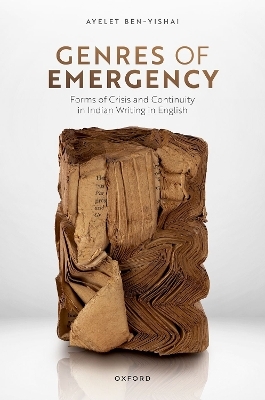
Genres of Emergency
Forms of Crisis and Continuity in Indian Writing in English
Seiten
2023
Oxford University Press (Verlag)
978-0-19-286619-6 (ISBN)
Oxford University Press (Verlag)
978-0-19-286619-6 (ISBN)
Genres of Emergency offers literary genre as a way to understand and negotiate the varied states of emergency and crisis that have become a fixture of our contemporary world, building on a critical study of the literature written during and about the State of Emergency declared by Indian Prime Minister Indira Gandhi (1975 - 1977).
Genres of Emergency offers literary genre as a way to understand and negotiate the varied states of emergency and crisis that have become a fixture of our contemporary world. Building on a critical study of the literature written during and about the State of Emergency declared by Prime Minister Indira Gandhi in India (1975 - 1977), the study establishes emergency and its genres as an important interpretative site: an exceptionally violent episode marked as a one-off crisis, which also functions as a locus for an ongoing renegotiation of a modern polity and culture. Reading a wide-ranging archive of English-language texts - from prison memoir to popular magazine, from high-brow literary fiction to boilerplate thriller, from the unrelentingly realistic to the mythically allegorical - Genres of Emergency traces the tension between crisis and continuity that these genres mediate. In addressing this tension, the authors of Emergency fiction take seriously the genres in which they write and use them to mobilize literary conventions as political interventions. More specifically, these novels use the conventions of realism, epic, allegory, and the thriller to reach back in time and across cultures and languages, invoking past iterations of these genres and histories and anticipating those to come. Combining literary criticism with cultural history, Genres of Emergency thus has implications for the study of literary genre, for the historical events that these genres recount, and for understanding the politics of literary form.
Genres of Emergency offers literary genre as a way to understand and negotiate the varied states of emergency and crisis that have become a fixture of our contemporary world. Building on a critical study of the literature written during and about the State of Emergency declared by Prime Minister Indira Gandhi in India (1975 - 1977), the study establishes emergency and its genres as an important interpretative site: an exceptionally violent episode marked as a one-off crisis, which also functions as a locus for an ongoing renegotiation of a modern polity and culture. Reading a wide-ranging archive of English-language texts - from prison memoir to popular magazine, from high-brow literary fiction to boilerplate thriller, from the unrelentingly realistic to the mythically allegorical - Genres of Emergency traces the tension between crisis and continuity that these genres mediate. In addressing this tension, the authors of Emergency fiction take seriously the genres in which they write and use them to mobilize literary conventions as political interventions. More specifically, these novels use the conventions of realism, epic, allegory, and the thriller to reach back in time and across cultures and languages, invoking past iterations of these genres and histories and anticipating those to come. Combining literary criticism with cultural history, Genres of Emergency thus has implications for the study of literary genre, for the historical events that these genres recount, and for understanding the politics of literary form.
Ayelet Ben-Yishai is Chair of the English Department at the University of Haifa. A comparatist by training (PhD, UC Berkeley) she also has a degree in law (LLB, Hebrew U). Her work informs and is informed by the intersections of law and literature and by postcolonial and narrative theory, in relation to the modern British novel, world literature, and the Indian novel. She has been an Honorary Fellow at the IRH at UW-Madison, a Fellow at the Cornell Society of Fellows, and a recipient of two ISF grants for her research on the postcolonial novel in India.
Introduction
1: Englishwala Politics
2: Family First
3: Realism
4: Epic
5: Allegory
6: Thriller
Conclusion: On Genre
| Erscheinungsdatum | 16.05.2023 |
|---|---|
| Zusatzinfo | 6 black and white illustrations |
| Verlagsort | Oxford |
| Sprache | englisch |
| Maße | 160 x 240 mm |
| Gewicht | 528 g |
| Themenwelt | Geisteswissenschaften ► Geschichte ► Allgemeines / Lexika |
| Geschichte ► Allgemeine Geschichte ► Neuzeit (bis 1918) | |
| Geschichte ► Teilgebiete der Geschichte ► Kulturgeschichte | |
| Geisteswissenschaften ► Sprach- / Literaturwissenschaft ► Anglistik / Amerikanistik | |
| Geisteswissenschaften ► Sprach- / Literaturwissenschaft ► Literaturwissenschaft | |
| ISBN-10 | 0-19-286619-2 / 0192866192 |
| ISBN-13 | 978-0-19-286619-6 / 9780192866196 |
| Zustand | Neuware |
| Haben Sie eine Frage zum Produkt? |
Mehr entdecken
aus dem Bereich
aus dem Bereich
Europa 1848/49 und der Kampf für eine neue Welt
Buch | Hardcover (2023)
DVA (Verlag)
48,00 €
Giordano Bruno - ein ketzerisches Leben
Buch | Hardcover (2024)
C.H.Beck (Verlag)
29,90 €


